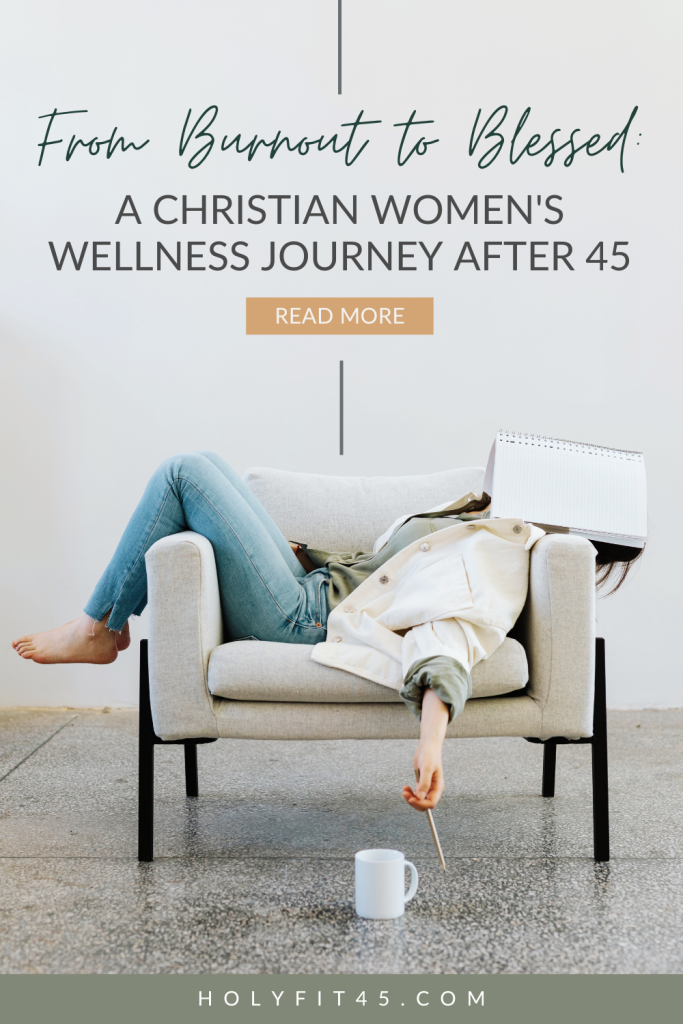When exhaustion masquerades as faithfulness and self-care feels like selfishness—discovering God’s heart for your wellness in midlife
She sits in her car after another endless day, gripping the steering wheel as waves of exhaustion wash over her. The kids need dinner. Her husband needs attention. Her mother needs help with appointments. Her church needs volunteers. Her job demands more hours.
And she? She needs Jesus. But even prayer feels like another item on an impossible to-do list.
If this sounds familiar, sweet sister, you’re not alone. You’re not failing. You’re beautifully and wonderfully made—but perhaps running on empty in a season that was never meant to drain your soul dry.
You’re experiencing what millions of Christian women over 45 face: the collision of midlife changes, mounting responsibilities, and the crushing weight of believing that good Christian women must sacrifice themselves completely. But what if I told you that God’s design for your life includes rest, renewal, and vibrant health—even after 45?
When “Dying to Self” Becomes Just… Dying
“Come to me, all you who are weary and burdened, and I will give you rest.” – Matthew 11:28
We’ve been taught that good Christian women sacrifice. We pour out. We serve until it hurts, then serve some more. Somewhere between the potluck committees and the late-night worry sessions, we lost sight of a crucial truth: God designed our bodies as temples, not disposable vessels.
The Bible doesn’t glorify exhaustion. Christ himself withdrew to pray, to rest, to be alone with the Father. He set boundaries. He said no. He modeled sustainable ministry, not martyrdom.
Yet here we are at 45, 50, 55—wondering why we’re so tired, so overwhelmed, so disconnected from the joy we once knew. We’ve been faithful servants, but we’ve forgotten we’re also beloved daughters.
The statistics tell a sobering story: According to recent health data, Christian women aged 45-59 have the highest age-specific rates of anxiety and depression—precisely the perimenopausal years when hormonal changes compound life stressors. Christian women aren’t exempt from these struggles, yet we often feel guilty for experiencing them.
But here’s what I’ve learned through my own journey from burnout to blessing: When we honor our bodies as God’s temples, we’re not being selfish—we’re being obedient.
The Hidden Crisis: High-Functioning Fatigue in Christian Women
“She is clothed with strength and dignity; she can laugh at the days to come.” – Proverbs 31:25
Let me introduce you to a term that might revolutionize how you understand your exhaustion: High-Functioning Fatigue. This isn’t the kind of tiredness that keeps you in bed—it’s the bone-deep weariness that lets you keep going but steals your joy, peace, and presence.
You show up. You perform. You smile at church. But inside, you’re running on fumes, wondering if this constant state of depletion is just your “new normal” after 45.
High-Functioning Fatigue shows up as:
- Feeling mentally “done” even after a full night’s sleep
- Needing caffeine to function and wine to wind down
- Snapping at the people you love most
- Losing interest in activities that once brought joy
- Feeling guilty every time you consider your own needs
- Brain fog that makes simple tasks feel overwhelming
Sound familiar? You’re not broken, sister. You’re experiencing the collision of multiple factors that uniquely impact Christian women in midlife: hormonal fluctuations, increased caregiving responsibilities, career demands, and spiritual expectations that were never meant to crush your spirit.
The Holy Intersection of Faith and Wellness After 45
“Or do you not know that your body is a temple of the Holy Spirit within you, whom you have from God? You are not your own, for you were bought with a price. So glorify God in your body.” – 1 Corinthians 6:19-20
What if caring for your body isn’t selfish—it’s stewardship? What if prioritizing your health isn’t vanity—it’s wisdom?
Scripture tells us our bodies are temples of the Holy Spirit. Not metaphorically. Actually. The Creator of the universe has chosen to dwell within you, and that sacred space deserves honor, care, and intentional tending.
This isn’t about achieving some impossible standard of perfection. It’s about approaching wellness as an act of worship, a form of gratitude for the vessel God has entrusted to you.
Your energy is a gift to be stewarded wisely. When you’re running on empty, everyone gets your leftovers—including God. When you’re rested and renewed, you have more to offer from a place of abundance rather than depletion.
The midlife difference is real: After 45, our bodies begin changing in ways that affect energy, mood, sleep, and resilience. Ignoring these changes isn’t spiritual—it’s unwise. Acknowledging them and adapting our self-care isn’t weakness—it’s wisdom.
Recognizing the Signs of Sacred Exhaustion
“Be still, and know that I am God.” – Psalm 46:10
Burnout in Christian women often masquerades as spiritual dedication. We think constant fatigue is the price of faithfulness. But God’s yoke is easy, His burden light—when we’re carrying what He actually asked us to carry.
You might be experiencing sacred exhaustion if you’re:
- Constantly tired despite adequate sleep
- Irritable with the people you love most
- Lost interest in activities that once brought joy
- Feeling guilty every time you consider your own needs
- Using caffeine, sugar, or other substances to keep going
- Experiencing frequent headaches, digestive issues, or muscle tension
- Feeling disconnected from God despite regular spiritual disciplines
These aren’t character flaws. They’re warning lights on the dashboard of your soul, gently alerting you that maintenance is needed.
Physical symptoms tell spiritual stories. That tension in your shoulders might be carrying burdens that aren’t yours. Those sleepless nights might be processing worries that belong in God’s hands. Your body is wonderfully designed to communicate—are you listening?
The Unique Challenge: Navigating Perimenopause and Faith
“To every thing there is a season, and a time to every purpose under the heaven.” – Ecclesiastes 3:1
Let’s address something many Christian women’s resources skip: the profound impact of perimenopause on your physical, emotional, and spiritual well-being. This isn’t just about hot flashes—it’s about navigating a complete biological transition while maintaining your faith, family, and calling.
Perimenopause typically begins in the early 40s and can last up to 10 years. During this time, declining estrogen affects not just your reproductive system but also:
- Serotonin production (impacting mood and sleep)
- Cortisol regulation (affecting stress response)
- Metabolism (making weight management more challenging)
- Cognitive function (creating that frustrating “brain fog”)
One woman I interviewed shared: “My hormones felt like I was swinging on a pendulum. It was a chaotic season in my life where I began to feel suicidal and nearly left my husband. I knew God loved me, but my symptoms left me overwhelmed and unable to cope.”
The silence around Christian women and menopause is deafening. Churches that offer marriage enrichment and parenting classes rarely address this transition that affects every Christian women. Yet statistics show that Christian women aged 45-59 have the highest suicide rates, correlating directly with perimenopausal years.
Your hormonal changes aren’t a spiritual failing—they’re a biological reality that requires both practical wisdom and spiritual grace.
Small Steps Toward Sacred Self-Care
“She sets about her work vigorously; her arms are strong for her tasks.” – Proverbs 31:17
The journey from burnout to blessing doesn’t require a complete life overhaul. It starts with small, intentional choices that honor both your humanity and your faith.
Morning Moments with the Master
Before you check your phone, before you think about everyone else’s needs, spend five minutes in His presence. Not performing, not petitioning—just being. Let Him fill your cup before you start pouring out.
Try this: Keep a devotional and journal by your bed. When you wake up, spend 5 minutes reading and responding before your feet hit the floor. This isn’t another task—it’s your lifeline.
Sabbath Isn’t Optional
God didn’t suggest rest—He commanded it. One day a week, step away from productivity. Read for pleasure. Take naps without guilt. Enjoy creation. Remember that your worth isn’t tied to your output.
The midlife Sabbath looks different: Maybe it’s not a full day, but it’s consistent moments throughout the week where you choose rest over rush, presence over productivity.
Move Your Temple with Intention
Exercise doesn’t have to be punishment for what you ate or penance for what you look like. It can be celebration of what your body can do, gratitude for its faithful service, connection with the God who designed you for movement.
After 45, gentle is powerful: Walking, swimming, yoga, resistance bands—movement that energizes rather than depletes. Your goal isn’t to compete with your 25-year-old self but to honor your current body.
Nourish, Don’t Punish
Food is God’s provision, meant to fuel and delight. Eating well isn’t about following the latest diet trend—it’s about stewarding your energy, stabilizing your mood, and honoring the body that carries you through each day.
Midlife nutrition priorities:
- Protein at every meal to support muscle mass and energy
- Omega-3 fatty acids for brain health and mood stability
- Fiber-rich foods to support hormonal balance
- Adequate hydration for energy and mental clarity
The Theology of Saying No
“All things are lawful for me, but not all things are helpful.” – 1 Corinthians 6:12
Jesus said no. To demands, to expectations, to good opportunities that weren’t His assigned path. If the Son of God needed boundaries, how much more do we?
Saying no to one thing always means saying yes to something else. When you decline that extra committee, you’re saying yes to presence with your family. When you skip that obligation that drains you, you’re saying yes to activities that restore your soul.
You cannot pour from an empty pitcher. This isn’t selfishness—it’s sustainability. The most loving thing you can do for others is to ensure you’re caring for yourself well enough to serve from overflow, not desperation.
Some seasons require more boundaries than others. Perimenopause, menopause, caring for aging parents, launching children—these transitions demand extra gentleness with yourself, not extra guilt about what you can’t do.
The “need is not the call” principle: Just because there’s a need doesn’t mean you’re called to meet it. God has equipped the body of Christ with diverse gifts and callings. Your responsibility is to steward your gifts well, not to be everything to everyone.
Building Your Village of Support
“As iron sharpens iron, so one person sharpens another.” – Proverbs 27:17
Isolation amplifies burnout. We were designed for community, for sisters who understand the unique challenges of this season, for friends who can speak truth in love when we’re too tired to see clearly.
Ask for help. This isn’t weakness—it’s wisdom. Let others bring meals when you’re overwhelmed. Accept offers to drive your kids. Say yes when someone offers to pray for you, run errands for you, or simply sit with you.
Find your tribe. Whether it’s a small group at church, a neighborhood walking group, or online communities of Christian women navigating similar seasons, you need people who get it. Who understand that some days, faithfulness looks like showing up in your pajamas with mascara smudged and honest prayers.
The power of intergenerational relationships: Seek out older Christian women who’ve walked this path with grace. Their wisdom about navigating midlife transitions while maintaining faith can be invaluable. Likewise, younger women need to see that it’s possible to age with dignity and purpose.
Understanding Your Body’s Changing Needs
“I praise you because I am fearfully and wonderfully made; your works are wonderful, I know that full well.” – Psalm 139:14
After 45, your body has different nutritional, movement, and rest needs. Honoring these changes isn’t vanity—it’s stewardship.
Sleep Becomes Non-Negotiable
Quality sleep affects everything: mood, energy, immune function, hormonal balance, and cognitive clarity. Create evening routines that honor both your need for rest and your desire for spiritual connection.
Sleep strategies for midlife:
- Keep your bedroom cool (helps with hot flashes)
- Limit caffeine after 2 PM
- Create a technology curfew
- Try magnesium supplementation (consult your healthcare provider)
- Use this time for prayer or meditation instead of scrolling
Stress Management as Spiritual Discipline
Chronic stress wreaks havoc on midlife hormones and can accelerate age-related health issues. Learning to manage stress isn’t selfish—it’s stewarding the body God gave you.
Faith-based stress relief:
- Breath prayers throughout the day
- Walking meditation with Scripture
- Journaling as a form of prayer
- Worship music during daily tasks
- Gratitude practices
The Perimenopause Game-Changer: Understanding Your Cycle
Even irregular periods provide information about your hormonal health. Tracking symptoms can help you understand patterns and prepare for challenging days.
What to track:
- Energy levels
- Mood changes
- Sleep quality
- Physical symptoms
- Spiritual/emotional state
This isn’t obsessive—it’s wise stewardship that helps you plan and adapt.
Rediscovering Joy in the Journey
“Weeping may endure for a night, but joy comes in the morning.” – Psalm 30:5
When did we decide that suffering equals spirituality? That joy is somehow less holy than struggle?
The fruit of the Spirit includes joy, peace, patience, kindness—qualities that flourish when we’re well-rested and well-cared for, not when we’re running on fumes and good intentions.
God delights in your delight. He created sunsets for your enjoyment, chocolate for your pleasure, friendship for your encouragement. Receiving His good gifts isn’t ungrateful—it’s worship.
Find what fills your soul and do more of it. Maybe it’s gardening, watching birds, crafting, reading fiction, taking photographs, cooking elaborate meals, or having deep conversations with friends. These aren’t frivolous luxuries—they’re how you stay connected to the abundant life Christ promised.
The midlife advantage: You’re old enough to know what brings you joy and young enough to pursue it. This season can be one of the richest of your life if you embrace rather than endure it.
Seasons of Pruning and Growth
“I am the vine; you are the branches. If you remain in me and I in you, you will bear much fruit; apart from me you can do nothing.” – John 15:5
God often uses our seasons of exhaustion to prune away what isn’t essential. Those commitments that once felt important might need to be released. That version of yourself that could do it all might need to be grieved and let go.
This isn’t failure—it’s metamorphosis. Like a butterfly, you can’t go back to being a caterpillar. The woman you’re becoming at 45+ has different strengths, different purposes, different callings than who you were at 25.
Embrace the evolution. Your energy might be different, but your wisdom is deeper. Your body might feel different, but your soul understands things now that only come with lived experience. Your capacity for certain activities might have changed, but your capacity for meaningful relationships, for deep impact, for authentic ministry has grown.
The pruning process is painful but purposeful. Let God cut away what’s no longer serving you so that what remains can flourish.
Wellness as Worship
“Therefore, I urge you, brothers and sisters, in view of God’s mercy, to offer your bodies as a living sacrifice, holy and pleasing to God—this is your true and proper worship.” – Romans 12:1
Every choice to care for yourself well can become an act of worship. Every healthy meal, every restful night’s sleep, every moment of joyful movement, every boundary you set—all offerings to the God who knit you together in your mother’s womb.
Your wellness impacts your witness. When you’re rested, joyful, and at peace, people notice. They want what you have. Not because you’re perfect, but because you’re living in the fullness God intended.
When you prioritize your health, you’re not being selfish—you’re being strategic. You’re positioning yourself to serve from abundance for years to come rather than burning out in a blaze of temporary glory.
The long view matters: What kind of 70-year-old do you want to be? What investments in your health today will allow you to serve joyfully for decades to come?
The Long View of Faithfulness
“But those who hope in the Lord will renew their strength. They will soar on wings like eagles; they will run and not grow weary, they will walk and not be faint.” – Isaiah 40:31
Faithfulness isn’t a sprint—it’s a marathon. The goal isn’t to exhaust yourself in service by 50, but to still be serving joyfully at 70, 80, and beyond.
This requires a different approach to wellness, one that honors both your current limitations and your future dreams. What kind of 65-year-old do you want to be? What will you need to invest in today to make that vision possible?
Your body is not disposable. It’s the vehicle God has given you for every act of service, every moment of worship, every expression of love you’ll offer in the years ahead. Treating it with honor isn’t vanity—it’s vision.
The empty nest advantage: As children become more independent, you have opportunities to reinvest in your health, relationships, and calling. This isn’t selfish—it’s strategic preparation for your next season of service.
From Survival to Flourishing
“The thief comes only to steal and kill and destroy; I have come that they may have life, and have it abundantly.” – John 10:10
The journey from burnout to blessing isn’t always linear. There will be setbacks, seasons of struggle, days when you feel like you’re starting over. This is normal, not failure.
Grace covers the hard days. Mercy meets you in the mess. And slowly, gently, as you begin to care for yourself with the same compassion you’d show a dear friend, something beautiful begins to happen.
Energy returns—not the frantic energy of your younger years, but a deeper, more sustainable vitality. Joy resurfaces—not constant happiness, but an underlying peace that doesn’t depend on circumstances. Purpose clarifies—not the scattered urgency of doing everything, but the focused intentionality of doing what matters.
Signs you’re moving from burnout to blessing:
- You wake up more often feeling rested than exhausted
- You find yourself saying no without guilt
- Small pleasures bring genuine joy
- You feel connected to God even in difficult circumstances
- Your relationships improve as you show up present rather than depleted
- You have energy for spontaneous acts of service and love
A Biblical Framework for Midlife Wellness
“She is clothed with strength and dignity; she can laugh at the days to come.” – Proverbs 31:25
Let’s establish a biblical foundation for why your wellness matters to God:
Your body is God’s temple (1 Corinthians 6:19-20): Caring for it is an act of worship, not vanity.
You are fearfully and wonderfully made (Psalm 139:14): This includes your changing, aging, beautiful midlife body.
God gives you rest (Psalm 23:2): Rest isn’t earned; it’s given. Receive it.
He renews your strength (Isaiah 40:31): You don’t have to manufacture energy; you can receive it from Him.
You are the light of the world (Matthew 5:14): A burned-out lamp can’t illuminate anything. Tend your flame.
He has plans for your future (Jeremiah 29:11): Your best days aren’t behind you; they’re ahead.
Practical Steps to Start Your Journey Today
“She gets up while it is still night; she provides food for her family and portions for her female servants.” – Proverbs 31:15
Ready to move from burnout toward blessing? Start with these grace-filled, practical steps:
Week 1: Assessment and Awareness
- Complete an honest assessment of your energy, joy, and health
- Track your sleep, energy, and mood for one week
- Identify your biggest drains and your most life-giving activities
- Schedule a comprehensive physical exam
Week 2: Small Sacred Changes
- Establish a 5-minute morning routine with God
- Add one protein-rich snack to your day
- Take a 10-minute walk while praying or listening to worship music
- Set a boundary around one energy-draining commitment
Week 3: Building Your Support System
- Identify one person who can provide practical help
- Find one person who can provide emotional/spiritual support
- Join an online community of Christian women navigating midlife
- Schedule coffee with an older woman you admire
Week 4: Sustainable Rhythms
- Plan one weekly “mini-sabbath” of 2-3 hours
- Establish an evening routine that promotes quality sleep
- Schedule one monthly activity that brings you pure joy
- Plan your meals one week in advance
Your Invitation to Abundance
“The Lord your God is with you, the Mighty Warrior who saves. He will take great delight in you; in his love he will no longer rebuke you, but will rejoice over you with singing.” – Zephaniah 3:17
Sister, you were never meant to just survive. You were created to thrive, to flourish, to experience the abundant life Jesus promised. This doesn’t mean life without challenges, but it does mean life with hope, purpose, and divine partnership in every struggle.
Your wellness journey after 45 isn’t about turning back the clock or competing with who you used to be. It’s about stewarding well the woman you are today, honoring the body that has carried you this far, and positioning yourself to receive all the goodness God still has in store.
You are not too old to start caring for yourself. You are not too busy to prioritize your wellness. You are not too far gone to experience transformation.
Start small. Start today. Start with the next choice—the glass of water, the early bedtime, the gentle no, the moment of gratitude. Each choice is a prayer, each healthy habit an act of faith in the future God is preparing for you.
The best is yet to come. Your midlife years can be the most purposeful, joyful, and impactful of your entire life. Not because you’re trying to recapture your youth, but because you’re finally wise enough to steward your gifts well.
From burnout to blessed—this isn’t just hope; it’s your invitation, your possibility, your promise.
Will you accept it?
If this message resonated with your heart, you’re not alone in this journey. What’s one small step you’ll take today to move from burnout toward blessing? Your future self—and everyone you’re called to love and serve—will thank you.




